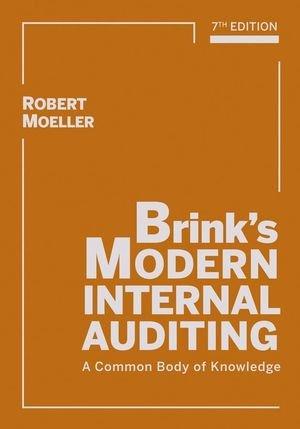Answered step by step
Verified Expert Solution
Question
1 Approved Answer
Can someone help me check my work and help me solve the incorrect ones? Last In begin{tabular}{|lrrr|} hline Day of Date & Units & Unit
Can someone help me check my work and help me solve the incorrect ones?
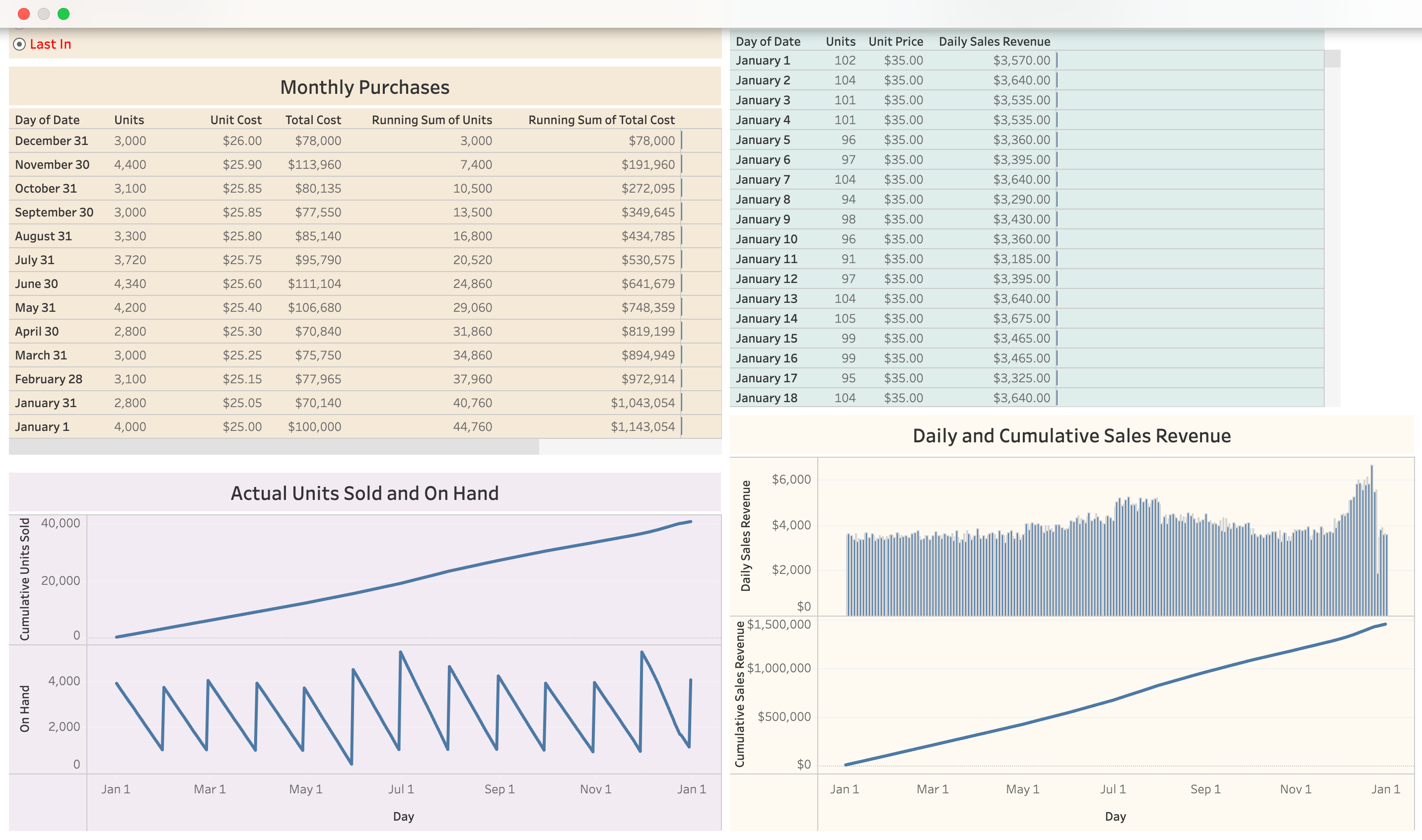
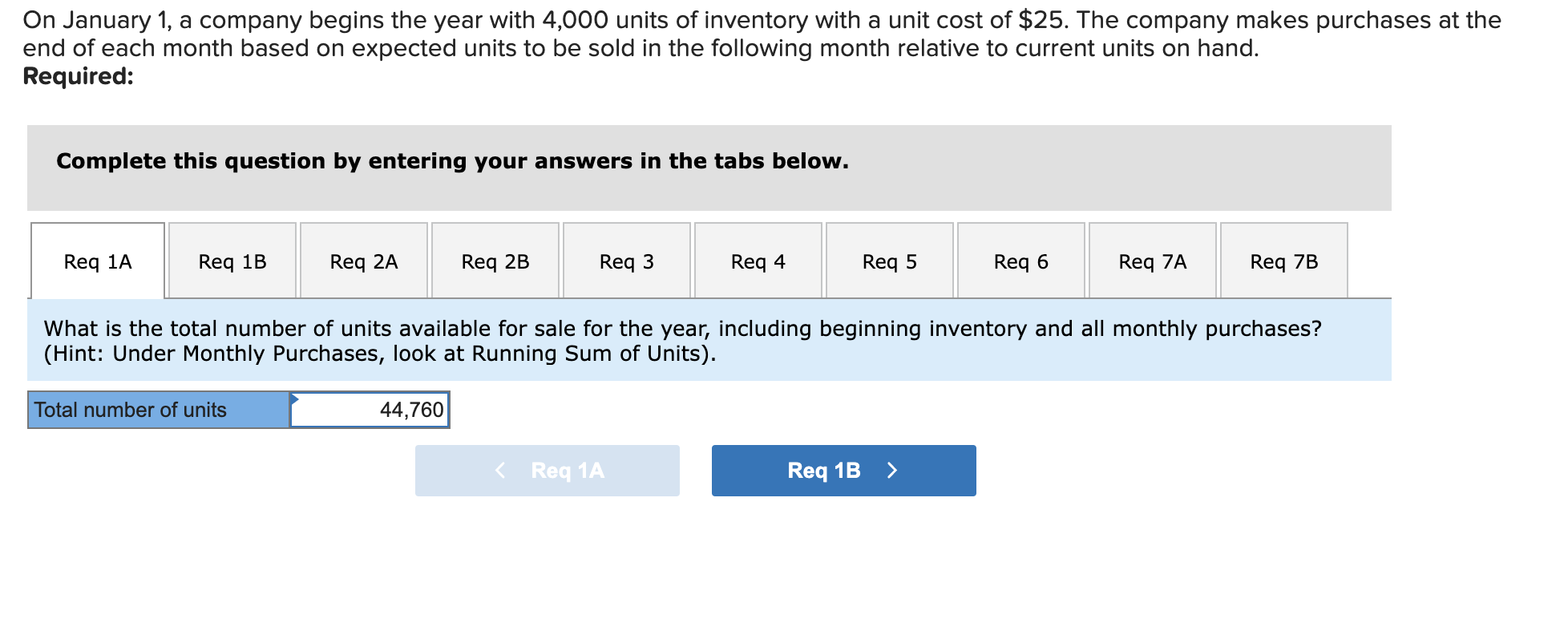





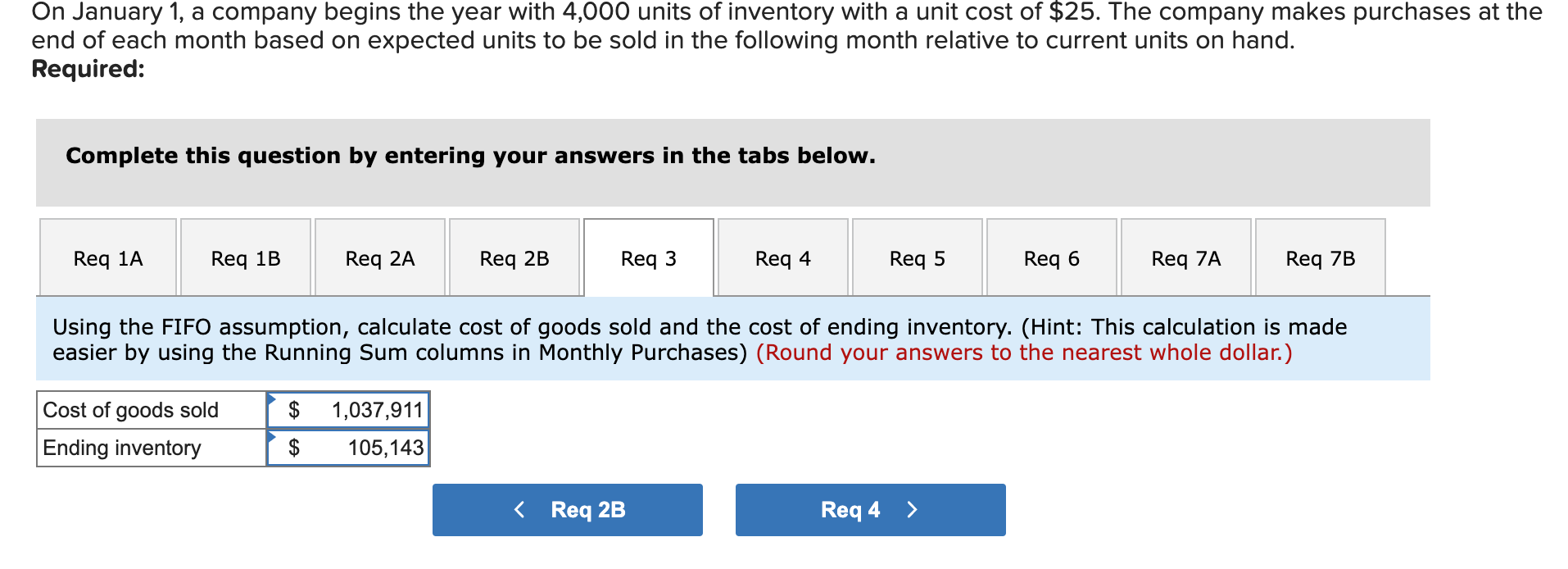



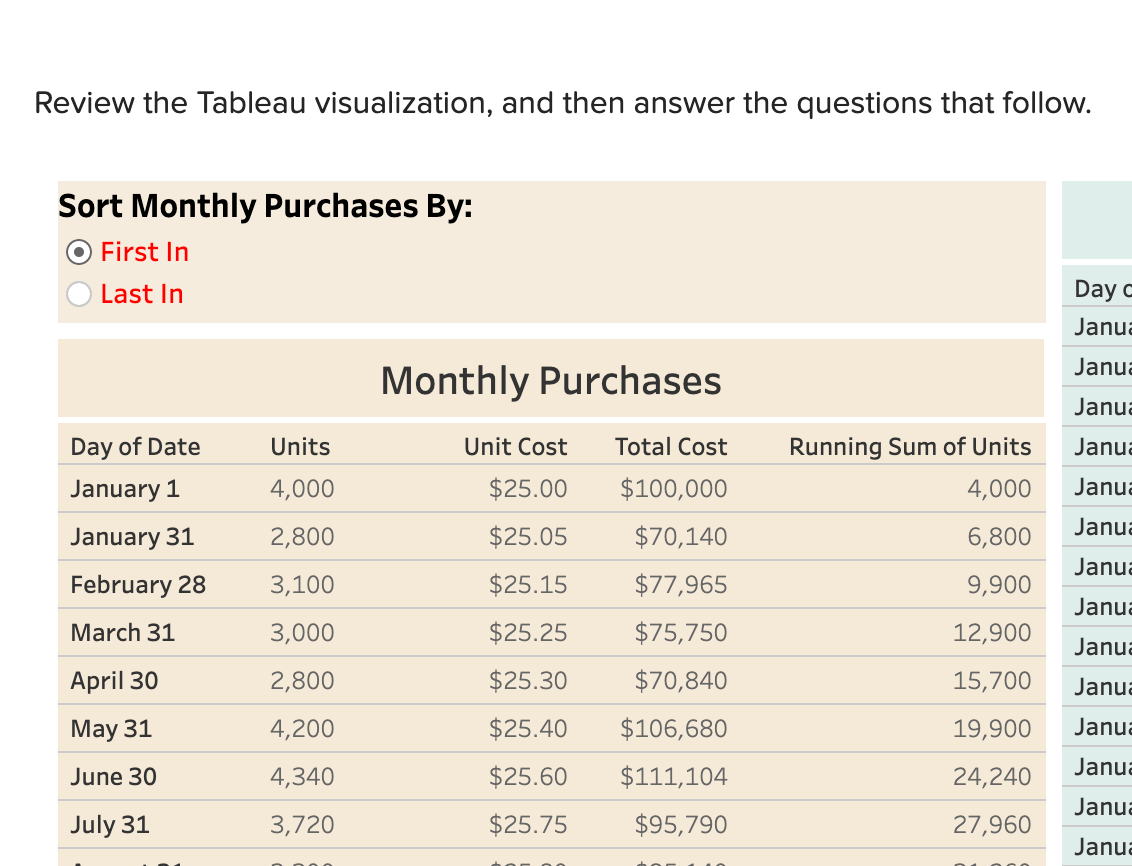
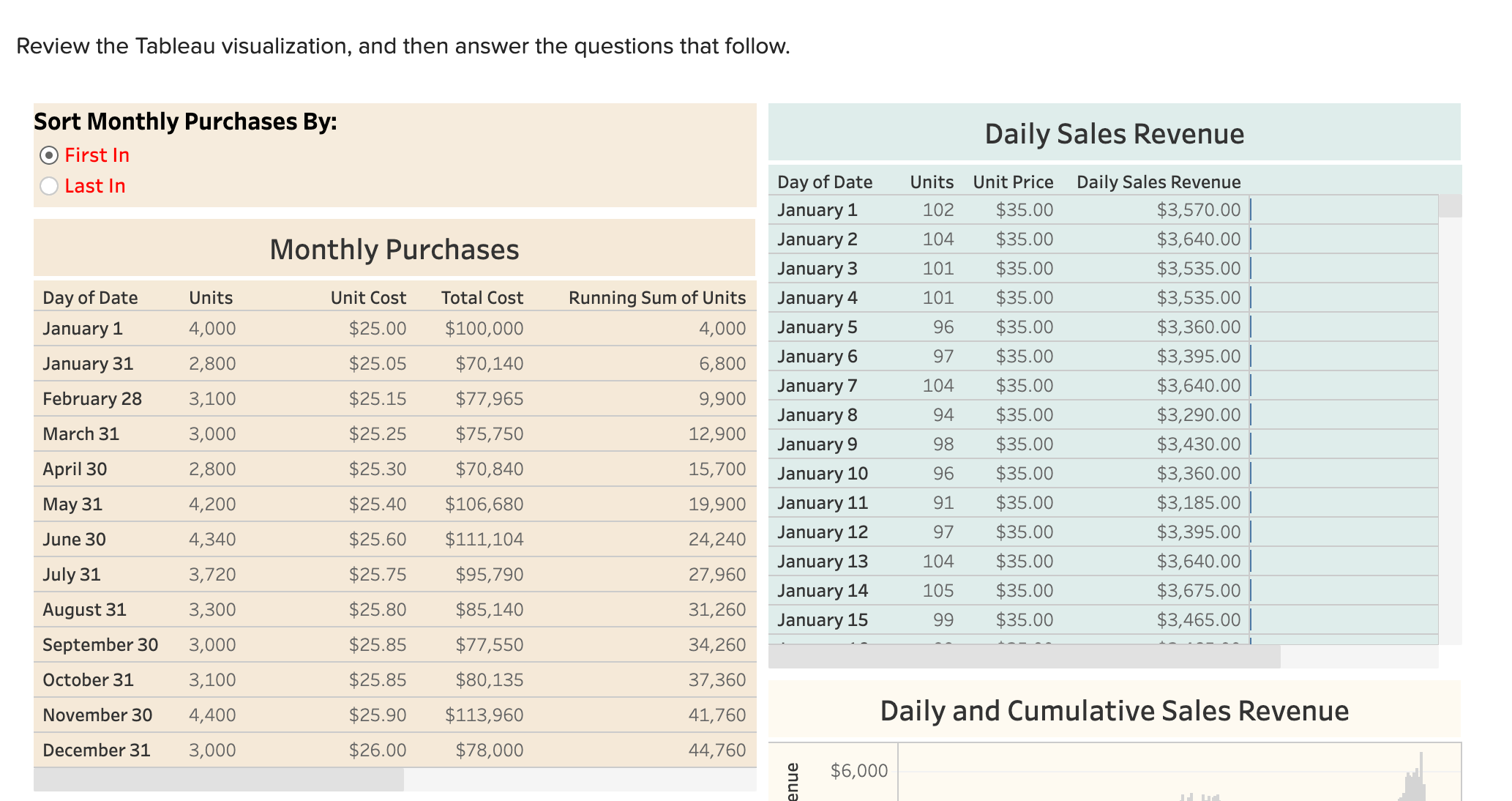 Last In \begin{tabular}{|lrrr|} \hline Day of Date & Units & Unit Price & Daily Sales Revenue \\ \hline January 1 & 102 & $35.00 & $3,570.00 \\ \hline January 2 & 104 & $35.00 & $3,640.00 \\ \hline January 3 & 101 & $35.00 & $3,535.00 \\ \hline January 4 & 101 & $35.00 & $3,535.00 \\ \hline January 5 & 96 & $35.00 & $3,360.00 \\ \hline January 6 & 97 & $35.00 & $3,395.00 \\ \hline January 7 & 104 & $35.00 & $3,640.00 \\ \hline January 8 & 94 & $35.00 & $3,290.00 \\ \hline January 9 & 98 & $35.00 & $3,430.00 \\ \hline January 10 & 96 & $35.00 & $3,360.00 \\ \hline January 11 & 91 & $35.00 & $3,185.00 \\ \hline January 12 & 97 & $35.00 & $3,395.00 \\ \hline January 13 & 104 & $35.00 & $3,640.00 \\ \hline January 14 & 105 & $35.00 & $3,675.00 \\ \hline January 15 & 99 & $35.00 & $3,465.00 \\ \hline January 16 & 99 & $35.00 & $3,465.00 \\ \hline January 17 & 95 & $35.00 & $3,325.00 \\ \hline January 18 & 104 & $35.00 & $3,640.00 \\ \hline \end{tabular} Daily and Cumulative Sales Revenue On January 1, a company begins the year with 4,000 units of inventory with a unit cost of $25. The company makes purchases at th end of each month based on expected units to be sold in the following month relative to current units on hand. Required: Complete this question by entering your answers in the tabs below. What is the total number of units available for sale for the year, including beginning inventory and all monthly purchases? (Hint: Under Monthly Purchases, look at Running Sum of Units). On January 1, a company begins the year with 4,000 units of inventory with a unit cost of $25. The company makes purchases at the end of each month based on expected units to be sold in the following month relative to current units on hand. Required: Complete this question by entering your answers in the tabs below. How many units were actually sold by December 31 ? Complete this question by entering your answers in the tabs below. What amount would be reported for sales revenue and gross profit for the year under FIFO? (Round your answers to the nearest whole dollar.) Complete this question by entering your answers in the tabs below. Using the LIFO assumption, calculate cost of goods sold and the cost of ending inventory. (Hint: this calculation is made easier by re-sorting monthly purchases and using the Running Sum columns) (Round your answers to the nearest whole dollar.) Complete this question by entering your answers in the tabs below. Using the weighted-average cost assumption, calculate cost of goods sold and the cost of ending inventory. (Round your answers to the nearest whole dollar.) Complete this question by entering your answers in the tabs below. Req 1B How many units were sold that day and for what unit price? How many units were sold that day and for what unit price? 850 units@ On January 1 , a company begins the year with 4,000 units of inventory with a unit cost of $25. The company makes purchases at the end of each month based on expected units to be sold in the following month relative to current units on hand. Required: Complete this question by entering your answers in the tabs below. Using the FIFO assumption, calculate cost of goods sold and the cost of ending inventory. (Hint: This calculation is made easier by using the Running Sum columns in Monthly Purchases) (Round your answers to the nearest whole dollar.) Complete this question by entering your answers in the tabs below. Which day has the highest daily revenue? On January 1, a company begins the year with 4,000 units of inventory with a unit cost of $25. The company makes purchases at the end of each month based on expected units to be sold in the following month relative to current units on hand. Required: Complete this question by entering your answers in the tabs below. What is the total cost of these units? (Hint: Under Monthly Purchases, look at Running Sum of Total Cost.) On January 1, a company begins the year with 4,000 units of inventory with a unit cost of $25. The company makes purchases at the end of each month based on expected units to be sold in the following month relative to current units on hand. Required: Complete this question by entering your answers in the tabs below. For which month did the company most underestimate units to be sold? (Hint: Find in which month inventory on hand moved closest to zero). For which month did the company most underestimate units to be sold? May eeview the Tableau visualization, and then answer the questions that follow. Sort Monthly Purchases By: First In Last In Review the Tableau visualization, and then answer the questions that follow. Sort Monthly Purchases By: First In Last In Last In \begin{tabular}{|lrrr|} \hline Day of Date & Units & Unit Price & Daily Sales Revenue \\ \hline January 1 & 102 & $35.00 & $3,570.00 \\ \hline January 2 & 104 & $35.00 & $3,640.00 \\ \hline January 3 & 101 & $35.00 & $3,535.00 \\ \hline January 4 & 101 & $35.00 & $3,535.00 \\ \hline January 5 & 96 & $35.00 & $3,360.00 \\ \hline January 6 & 97 & $35.00 & $3,395.00 \\ \hline January 7 & 104 & $35.00 & $3,640.00 \\ \hline January 8 & 94 & $35.00 & $3,290.00 \\ \hline January 9 & 98 & $35.00 & $3,430.00 \\ \hline January 10 & 96 & $35.00 & $3,360.00 \\ \hline January 11 & 91 & $35.00 & $3,185.00 \\ \hline January 12 & 97 & $35.00 & $3,395.00 \\ \hline January 13 & 104 & $35.00 & $3,640.00 \\ \hline January 14 & 105 & $35.00 & $3,675.00 \\ \hline January 15 & 99 & $35.00 & $3,465.00 \\ \hline January 16 & 99 & $35.00 & $3,465.00 \\ \hline January 17 & 95 & $35.00 & $3,325.00 \\ \hline January 18 & 104 & $35.00 & $3,640.00 \\ \hline \end{tabular} Daily and Cumulative Sales Revenue On January 1, a company begins the year with 4,000 units of inventory with a unit cost of $25. The company makes purchases at th end of each month based on expected units to be sold in the following month relative to current units on hand. Required: Complete this question by entering your answers in the tabs below. What is the total number of units available for sale for the year, including beginning inventory and all monthly purchases? (Hint: Under Monthly Purchases, look at Running Sum of Units). On January 1, a company begins the year with 4,000 units of inventory with a unit cost of $25. The company makes purchases at the end of each month based on expected units to be sold in the following month relative to current units on hand. Required: Complete this question by entering your answers in the tabs below. How many units were actually sold by December 31 ? Complete this question by entering your answers in the tabs below. What amount would be reported for sales revenue and gross profit for the year under FIFO? (Round your answers to the nearest whole dollar.) Complete this question by entering your answers in the tabs below. Using the LIFO assumption, calculate cost of goods sold and the cost of ending inventory. (Hint: this calculation is made easier by re-sorting monthly purchases and using the Running Sum columns) (Round your answers to the nearest whole dollar.) Complete this question by entering your answers in the tabs below. Using the weighted-average cost assumption, calculate cost of goods sold and the cost of ending inventory. (Round your answers to the nearest whole dollar.) Complete this question by entering your answers in the tabs below. Req 1B How many units were sold that day and for what unit price? How many units were sold that day and for what unit price? 850 units@ On January 1 , a company begins the year with 4,000 units of inventory with a unit cost of $25. The company makes purchases at the end of each month based on expected units to be sold in the following month relative to current units on hand. Required: Complete this question by entering your answers in the tabs below. Using the FIFO assumption, calculate cost of goods sold and the cost of ending inventory. (Hint: This calculation is made easier by using the Running Sum columns in Monthly Purchases) (Round your answers to the nearest whole dollar.) Complete this question by entering your answers in the tabs below. Which day has the highest daily revenue? On January 1, a company begins the year with 4,000 units of inventory with a unit cost of $25. The company makes purchases at the end of each month based on expected units to be sold in the following month relative to current units on hand. Required: Complete this question by entering your answers in the tabs below. What is the total cost of these units? (Hint: Under Monthly Purchases, look at Running Sum of Total Cost.) On January 1, a company begins the year with 4,000 units of inventory with a unit cost of $25. The company makes purchases at the end of each month based on expected units to be sold in the following month relative to current units on hand. Required: Complete this question by entering your answers in the tabs below. For which month did the company most underestimate units to be sold? (Hint: Find in which month inventory on hand moved closest to zero). For which month did the company most underestimate units to be sold? May eeview the Tableau visualization, and then answer the questions that follow. Sort Monthly Purchases By: First In Last In Review the Tableau visualization, and then answer the questions that follow. Sort Monthly Purchases By: First In Last In
Last In \begin{tabular}{|lrrr|} \hline Day of Date & Units & Unit Price & Daily Sales Revenue \\ \hline January 1 & 102 & $35.00 & $3,570.00 \\ \hline January 2 & 104 & $35.00 & $3,640.00 \\ \hline January 3 & 101 & $35.00 & $3,535.00 \\ \hline January 4 & 101 & $35.00 & $3,535.00 \\ \hline January 5 & 96 & $35.00 & $3,360.00 \\ \hline January 6 & 97 & $35.00 & $3,395.00 \\ \hline January 7 & 104 & $35.00 & $3,640.00 \\ \hline January 8 & 94 & $35.00 & $3,290.00 \\ \hline January 9 & 98 & $35.00 & $3,430.00 \\ \hline January 10 & 96 & $35.00 & $3,360.00 \\ \hline January 11 & 91 & $35.00 & $3,185.00 \\ \hline January 12 & 97 & $35.00 & $3,395.00 \\ \hline January 13 & 104 & $35.00 & $3,640.00 \\ \hline January 14 & 105 & $35.00 & $3,675.00 \\ \hline January 15 & 99 & $35.00 & $3,465.00 \\ \hline January 16 & 99 & $35.00 & $3,465.00 \\ \hline January 17 & 95 & $35.00 & $3,325.00 \\ \hline January 18 & 104 & $35.00 & $3,640.00 \\ \hline \end{tabular} Daily and Cumulative Sales Revenue On January 1, a company begins the year with 4,000 units of inventory with a unit cost of $25. The company makes purchases at th end of each month based on expected units to be sold in the following month relative to current units on hand. Required: Complete this question by entering your answers in the tabs below. What is the total number of units available for sale for the year, including beginning inventory and all monthly purchases? (Hint: Under Monthly Purchases, look at Running Sum of Units). On January 1, a company begins the year with 4,000 units of inventory with a unit cost of $25. The company makes purchases at the end of each month based on expected units to be sold in the following month relative to current units on hand. Required: Complete this question by entering your answers in the tabs below. How many units were actually sold by December 31 ? Complete this question by entering your answers in the tabs below. What amount would be reported for sales revenue and gross profit for the year under FIFO? (Round your answers to the nearest whole dollar.) Complete this question by entering your answers in the tabs below. Using the LIFO assumption, calculate cost of goods sold and the cost of ending inventory. (Hint: this calculation is made easier by re-sorting monthly purchases and using the Running Sum columns) (Round your answers to the nearest whole dollar.) Complete this question by entering your answers in the tabs below. Using the weighted-average cost assumption, calculate cost of goods sold and the cost of ending inventory. (Round your answers to the nearest whole dollar.) Complete this question by entering your answers in the tabs below. Req 1B How many units were sold that day and for what unit price? How many units were sold that day and for what unit price? 850 units@ On January 1 , a company begins the year with 4,000 units of inventory with a unit cost of $25. The company makes purchases at the end of each month based on expected units to be sold in the following month relative to current units on hand. Required: Complete this question by entering your answers in the tabs below. Using the FIFO assumption, calculate cost of goods sold and the cost of ending inventory. (Hint: This calculation is made easier by using the Running Sum columns in Monthly Purchases) (Round your answers to the nearest whole dollar.) Complete this question by entering your answers in the tabs below. Which day has the highest daily revenue? On January 1, a company begins the year with 4,000 units of inventory with a unit cost of $25. The company makes purchases at the end of each month based on expected units to be sold in the following month relative to current units on hand. Required: Complete this question by entering your answers in the tabs below. What is the total cost of these units? (Hint: Under Monthly Purchases, look at Running Sum of Total Cost.) On January 1, a company begins the year with 4,000 units of inventory with a unit cost of $25. The company makes purchases at the end of each month based on expected units to be sold in the following month relative to current units on hand. Required: Complete this question by entering your answers in the tabs below. For which month did the company most underestimate units to be sold? (Hint: Find in which month inventory on hand moved closest to zero). For which month did the company most underestimate units to be sold? May eeview the Tableau visualization, and then answer the questions that follow. Sort Monthly Purchases By: First In Last In Review the Tableau visualization, and then answer the questions that follow. Sort Monthly Purchases By: First In Last In Last In \begin{tabular}{|lrrr|} \hline Day of Date & Units & Unit Price & Daily Sales Revenue \\ \hline January 1 & 102 & $35.00 & $3,570.00 \\ \hline January 2 & 104 & $35.00 & $3,640.00 \\ \hline January 3 & 101 & $35.00 & $3,535.00 \\ \hline January 4 & 101 & $35.00 & $3,535.00 \\ \hline January 5 & 96 & $35.00 & $3,360.00 \\ \hline January 6 & 97 & $35.00 & $3,395.00 \\ \hline January 7 & 104 & $35.00 & $3,640.00 \\ \hline January 8 & 94 & $35.00 & $3,290.00 \\ \hline January 9 & 98 & $35.00 & $3,430.00 \\ \hline January 10 & 96 & $35.00 & $3,360.00 \\ \hline January 11 & 91 & $35.00 & $3,185.00 \\ \hline January 12 & 97 & $35.00 & $3,395.00 \\ \hline January 13 & 104 & $35.00 & $3,640.00 \\ \hline January 14 & 105 & $35.00 & $3,675.00 \\ \hline January 15 & 99 & $35.00 & $3,465.00 \\ \hline January 16 & 99 & $35.00 & $3,465.00 \\ \hline January 17 & 95 & $35.00 & $3,325.00 \\ \hline January 18 & 104 & $35.00 & $3,640.00 \\ \hline \end{tabular} Daily and Cumulative Sales Revenue On January 1, a company begins the year with 4,000 units of inventory with a unit cost of $25. The company makes purchases at th end of each month based on expected units to be sold in the following month relative to current units on hand. Required: Complete this question by entering your answers in the tabs below. What is the total number of units available for sale for the year, including beginning inventory and all monthly purchases? (Hint: Under Monthly Purchases, look at Running Sum of Units). On January 1, a company begins the year with 4,000 units of inventory with a unit cost of $25. The company makes purchases at the end of each month based on expected units to be sold in the following month relative to current units on hand. Required: Complete this question by entering your answers in the tabs below. How many units were actually sold by December 31 ? Complete this question by entering your answers in the tabs below. What amount would be reported for sales revenue and gross profit for the year under FIFO? (Round your answers to the nearest whole dollar.) Complete this question by entering your answers in the tabs below. Using the LIFO assumption, calculate cost of goods sold and the cost of ending inventory. (Hint: this calculation is made easier by re-sorting monthly purchases and using the Running Sum columns) (Round your answers to the nearest whole dollar.) Complete this question by entering your answers in the tabs below. Using the weighted-average cost assumption, calculate cost of goods sold and the cost of ending inventory. (Round your answers to the nearest whole dollar.) Complete this question by entering your answers in the tabs below. Req 1B How many units were sold that day and for what unit price? How many units were sold that day and for what unit price? 850 units@ On January 1 , a company begins the year with 4,000 units of inventory with a unit cost of $25. The company makes purchases at the end of each month based on expected units to be sold in the following month relative to current units on hand. Required: Complete this question by entering your answers in the tabs below. Using the FIFO assumption, calculate cost of goods sold and the cost of ending inventory. (Hint: This calculation is made easier by using the Running Sum columns in Monthly Purchases) (Round your answers to the nearest whole dollar.) Complete this question by entering your answers in the tabs below. Which day has the highest daily revenue? On January 1, a company begins the year with 4,000 units of inventory with a unit cost of $25. The company makes purchases at the end of each month based on expected units to be sold in the following month relative to current units on hand. Required: Complete this question by entering your answers in the tabs below. What is the total cost of these units? (Hint: Under Monthly Purchases, look at Running Sum of Total Cost.) On January 1, a company begins the year with 4,000 units of inventory with a unit cost of $25. The company makes purchases at the end of each month based on expected units to be sold in the following month relative to current units on hand. Required: Complete this question by entering your answers in the tabs below. For which month did the company most underestimate units to be sold? (Hint: Find in which month inventory on hand moved closest to zero). For which month did the company most underestimate units to be sold? May eeview the Tableau visualization, and then answer the questions that follow. Sort Monthly Purchases By: First In Last In Review the Tableau visualization, and then answer the questions that follow. Sort Monthly Purchases By: First In Last In Step by Step Solution
There are 3 Steps involved in it
Step: 1

Get Instant Access to Expert-Tailored Solutions
See step-by-step solutions with expert insights and AI powered tools for academic success
Step: 2

Step: 3

Ace Your Homework with AI
Get the answers you need in no time with our AI-driven, step-by-step assistance
Get Started


